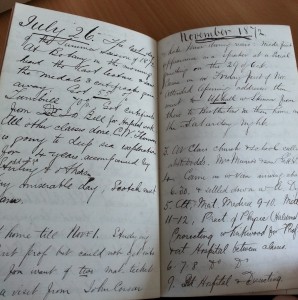This week is one of the busiest times of the year for the University of Edinburgh, and a momentous week for our brand new students – it’s Fresher’s Week!
The ‘Towards Dolly’ collections are rich in detail about the research and careers of Edinburgh’s scientists, but there isn’t so much concerning the early parts of their lives. So I was especially surprised when, cataloguing the archives of James Cossar Ewart (Professor of Natural History, 1882-1927) during an earlier part of the project, I came across a perfectly preserved diary from his undergraduate days. This small volume, filled with Ewart’s flowery but sometimes erratic handwriting, captures precious details from his own first experiences of student life. In some ways, they don’t differ hugely from the experiences of a fresher from today; in others, they reveal a University on the brink of major changes, particularly where the education of women was concerned.
Ewart began his medical studies on 1 November 1870, taking classes at the Royal Colleges of Surgeons and Physicians as well as the University, as was common at that time. The subjects Ewart studied ranged from anatomy and chemistry to botany, and he was taught by many names now well-known to us, including Joseph Lister. As soon as teaching began, Ewart was plunged into a strict schedule of classes, practical demonstrations, examinations and private study, sometimes stretching from 6am until midnight. Not all of Ewart’s classmates took their study so seriously, however. An entry for 2 November describes a somewhat raucous lecture: ‘Went to hear Dr Simpson at 2 but the C[lass] Room was crowded & nothing but hisses, roars & thundering of feet could be heard. Such a disorderly meeting was never held within the walls.’
However, it wasn’t all work; Ewart’s diary also reveals how he liked to enjoy his leisure
time. with walks, theatre, the circus, and even skating on Duddingston Loch. Like many students before and since, Ewart sometimes became embroiled in passionate debates and discussions with his new friends, with sometimes painful results: ‘Had a long argument with [a friend] Dumbreck on Religion. Headache.’ (14 November). The back of the diary is used to meticulously record Ewart’s income and expenditure on class fees, board and lodgings, travel, clothes, books and meals. The budget for his first fortnight as a student (£19 5s 6d) shows that he balanced the books expertly, with five and a half pence to spare! Like many students nowadays, Ewart’s parents helped him out a little when it came to the comforts of life: ‘Got box from home with our cart, containing clothes, books, jam, pancakes &c.’ (10 November).
Ewart was a medical student at an interesting time in the University’s history. In 1869, just a year before Ewart began, Sophia Jex-Blake was reluctantly permitted by the authorities to attend a limited number of classes at the Medical School. This started a heated and long-running battle for women to enter medicine, of which Ewart was plainly aware. An entry for 18 November records the treatment some of the new female arrivals could expect: ‘Awful rows with the University students. They almost mobbed the ladies, made awful noise in passage; sent a sheep into the class room. When the ladies went home they treated them shamefully.’ Four days later, Ewart recorded that the students responsible were fined, and ‘The Ladies all got gentlemen to arm them home.’
James Cossar Ewart graduated with the degree Bachelor of Medicine, Master of Surgery in 1874. He went on to gain his MD four years later. In 1882, he became Regius Professor of Natural History at the University, a post he held until his retirement in 1927.
Clare Button
Project Archivist


